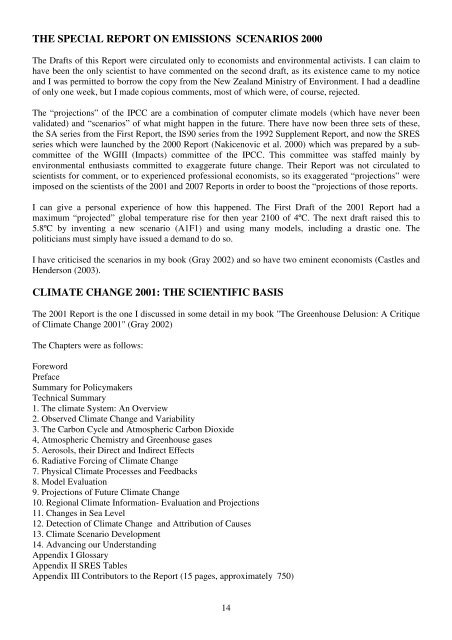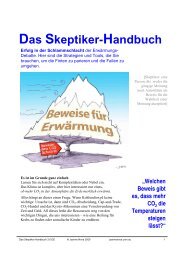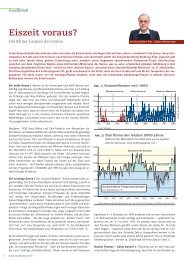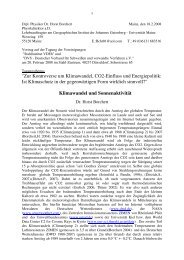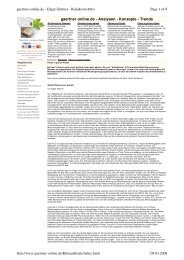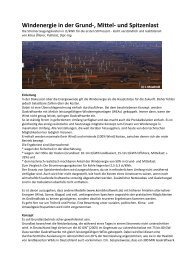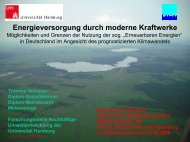SPINNING THE CLIMATE Vincent Gray - KlimaNotizen
SPINNING THE CLIMATE Vincent Gray - KlimaNotizen
SPINNING THE CLIMATE Vincent Gray - KlimaNotizen
You also want an ePaper? Increase the reach of your titles
YUMPU automatically turns print PDFs into web optimized ePapers that Google loves.
<strong>THE</strong> SPECIAL REPORT ON EMISSIONS SCENARIOS 2000<br />
The Drafts of this Report were circulated only to economists and environmental activists. I can claim to<br />
have been the only scientist to have commented on the second draft, as its existence came to my notice<br />
and I was permitted to borrow the copy from the New Zealand Ministry of Environment. I had a deadline<br />
of only one week, but I made copious comments, most of which were, of course, rejected.<br />
The “projections” of the IPCC are a combination of computer climate models (which have never been<br />
validated) and “scenarios” of what might happen in the future. There have now been three sets of these,<br />
the SA series from the First Report, the IS90 series from the 1992 Supplement Report, and now the SRES<br />
series which were launched by the 2000 Report (Nakicenovic et al. 2000) which was prepared by a subcommittee<br />
of the WGIII (Impacts) committee of the IPCC. This committee was staffed mainly by<br />
environmental enthusiasts committed to exaggerate future change. Their Report was not circulated to<br />
scientists for comment, or to experienced professional economists, so its exaggerated “projections” were<br />
imposed on the scientists of the 2001 and 2007 Reports in order to boost the “projections of those reports.<br />
I can give a personal experience of how this happened. The First Draft of the 2001 Report had a<br />
maximum “projected” global temperature rise for then year 2100 of 4ºC. The next draft raised this to<br />
5.8ºC by inventing a new scenario (A1F1) and using many models, including a drastic one. The<br />
politicians must simply have issued a demand to do so.<br />
I have criticised the scenarios in my book (<strong>Gray</strong> 2002) and so have two eminent economists (Castles and<br />
Henderson (2003).<br />
<strong>CLIMATE</strong> CHANGE 2001: <strong>THE</strong> SCIENTIFIC BASIS<br />
The 2001 Report is the one I discussed in some detail in my book "The Greenhouse Delusion: A Critique<br />
of Climate Change 2001" (<strong>Gray</strong> 2002)<br />
The Chapters were as follows:<br />
Foreword<br />
Preface<br />
Summary for Policymakers<br />
Technical Summary<br />
1. The climate System: An Overview<br />
2. Observed Climate Change and Variability<br />
3. The Carbon Cycle and Atmospheric Carbon Dioxide<br />
4, Atmospheric Chemistry and Greenhouse gases<br />
5. Aerosols, their Direct and Indirect Effects<br />
6. Radiative Forcing of Climate Change<br />
7. Physical Climate Processes and Feedbacks<br />
8. Model Evaluation<br />
9. Projections of Future Climate Change<br />
10. Regional Climate Information- Evaluation and Projections<br />
11. Changes in Sea Level<br />
12. Detection of Climate Change and Attribution of Causes<br />
13. Climate Scenario Development<br />
14. Advancing our Understanding<br />
Appendix I Glossary<br />
Appendix II SRES Tables<br />
Appendix III Contributors to the Report (15 pages, approximately 750)<br />
14


